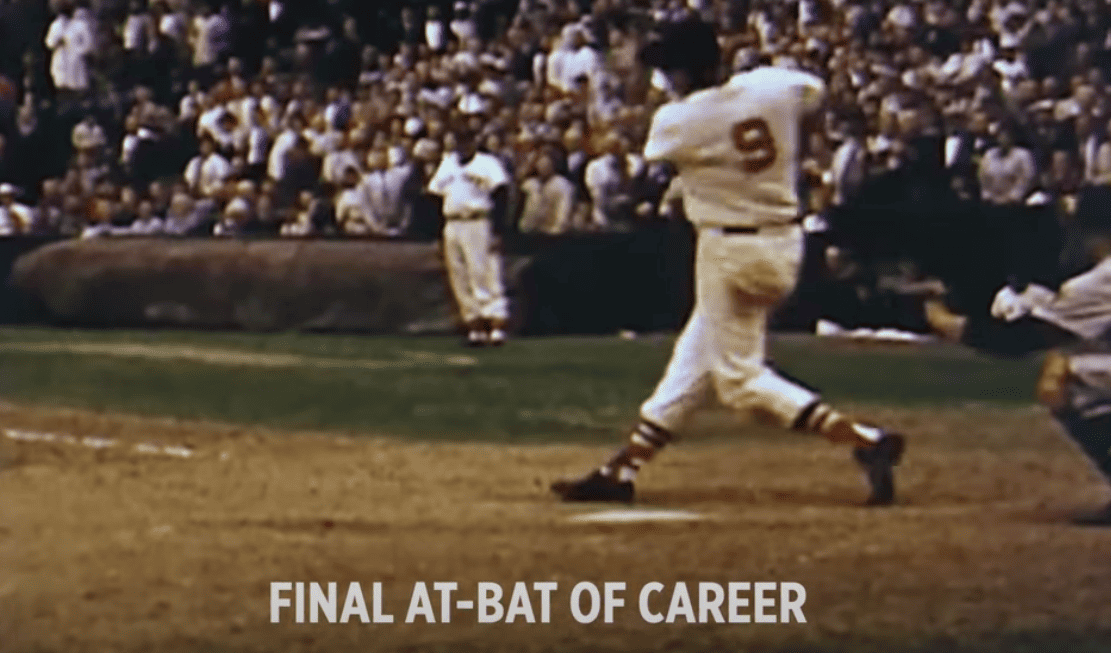Last Updated: March 1st, 2024 by Jake Cain
Ted Williams’ career finale at Fenway Park on September 28, 1960, became an iconic moment in baseball history—a story of perseverance, skill, and an unyielding commitment to excellence. As detailed by RetroSeasons and History.com, Williams, who had expressed his life’s ambition to be recognized as the greatest hitter who ever lived, encapsulated his baseball journey with one final home run.
Williams’ tenacity and dedication were evident from his early days. At just 17, he received a piece of advice from Lefty O’Doul that would guide his formidable career: “never let anyone change you.” As a testament to his potential, even before he fully matured as a player, baseball legend Eddie Collins compared him to great Joe Jackson, foreshadowing the legendary status Williams would ultimately achieve.
His career statistics are a testament to his prowess at the plate, boasting six batting titles, four home run crowns, four times leading in RBIs, and the revered accomplishment of hitting .406 in 1941. Yet, Williams’ path was not one of unbroken successes and accolades.
His service as a Navy pilot in World War II and a Marine in the Korean War interrupted his baseball career. Yet, he always returned to the diamond with the same fervor and skill, even if that meant battling the media scrutiny or fan criticism that followed him throughout his time with the Red Sox.
This complex relationship with fans and press peaked in his final game. Despite hitting .316 and belting 29 home runs that season at age 42, the crowd in Fenway was sparse. But when he sent a Jack Fisher pitch soaring over the Boston bullpen, those present knew they witnessed a historic moment. Williams, as stubborn and self-assured as ever, refused to tip his cap—a gesture that would have signaled acknowledgment and possibly reconciliation with the fans who had both adulated and criticized him over the years.
This act was so defining that it prompted literary giant John Updike to pen “Hub Fans Bid Kid Adieu”—a work that immortalized Williams’ complex relationship with the Boston faithful.
Reflecting on Williams’ journey and his final swing, we’re reminded that great athletes often forge their path despite, or perhaps because of, the obstacles and personal battles they face.
Williams once described his career as “the greatest fight I ever had,” acknowledging both the challenge and the joy of mastering the game he so loved. His career was not shaped by luck but by relentless work and an unwavering commitment to his own standards of greatness.
Williams let his bat do the talking until the very end. And while he never did tip his hat to the crowd, his farewell homer spoke volumes about his character: a man of principle, determined to exit the game on his own terms. This moment at Fenway was not just the final at-bat of a baseball titan; it was the culmination of a lifelong commitment to excellence, a symbol of his complex relationship with fame, and the closing chapter of a storybook career.
Ted Williams’ tale is a valuable lesson in integrity and individuality. It’s a reminder that greatness does not bend to the whims of others and that legacy is often written in actions, not gestures. As the echoes of that final home run have long since faded from Fenway Park, the image of a tenacious
Ted Williams defiantly rounding the bases remains a powerful symbol for athletes and fans alike—a reminder of the timeless splendor of baseball and the indomitable spirit that defines its heroes.

